Russia ‘will not be afraid to use nuclear weapons in a war with NATO because it believes the US would not dare to respond’
Russia’s willingness to use nuclear weapons in a potential conflict with NATO is growing as the Kremlin believes the US and its allies would not dare respond, a think tank warned yesterday.
“Knowing that the West is victim- and risk-averse, Russia could attempt to use enough non-strategic nuclear weapons (NSNW) to inflict damage to prevent its own defeat,” the International Institute for Strategic Studies report said (IISS).
“(Russia knows) the US would be unwilling to cross the nuclear threshold in retaliation, and could end the conflict prematurely.
“Russia’s perception of the lack of credible Western will to use nuclear weapons or accept casualties in conflict further reinforces Russia’s aggressive NSNW thinking and doctrine,” the report concluded.
The report said the logic of using such a nuclear weapon would be to escalate a conflict in a controlled manner, “either to prevent the US and NATO from interfering or to force them to end of the war on Russian terms’.
NSNWs include all nuclear weapons with a range of up to 5,400 kilometers, starting with tactical weapons designed for battlefield use – as opposed to longer-range strategic nuclear weapons that Russia or the US might use to attack each other’s homelands.
Russian nuclear Yars missile launch in October 2022
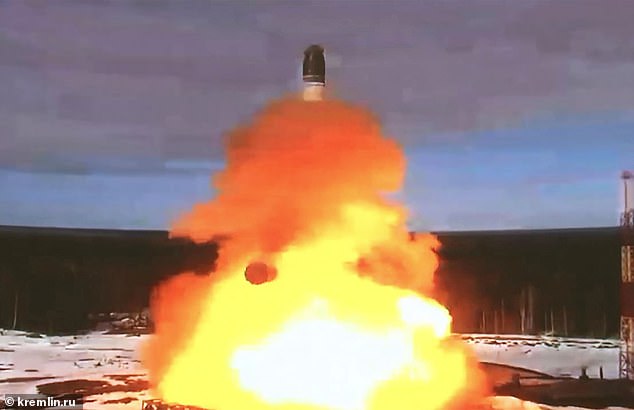
Launch of the Sarmat ballistic missile in April 2022
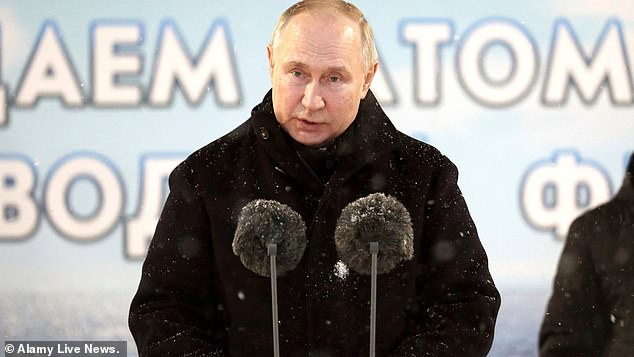
Russian President Vladimir Putin makes remarks during a flag-raising ceremony for the Russian Navy’s Borei-class nuclear-powered ballistic missile submarines at the Sevmash shipyard, December 12, 2023 in Severodvinsk, Arkhangelsk Region, Russia
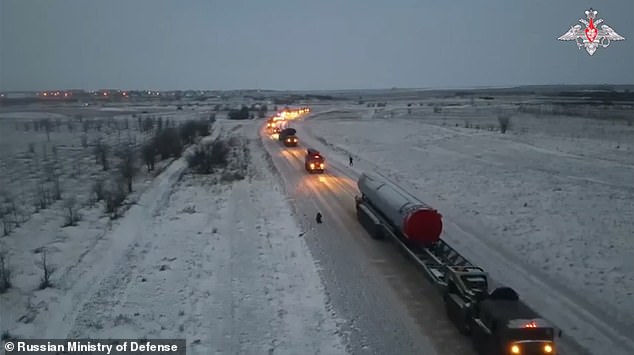
Movement of Russian nuclear-capable hypersonic missiles in the Orenburg region of Russia
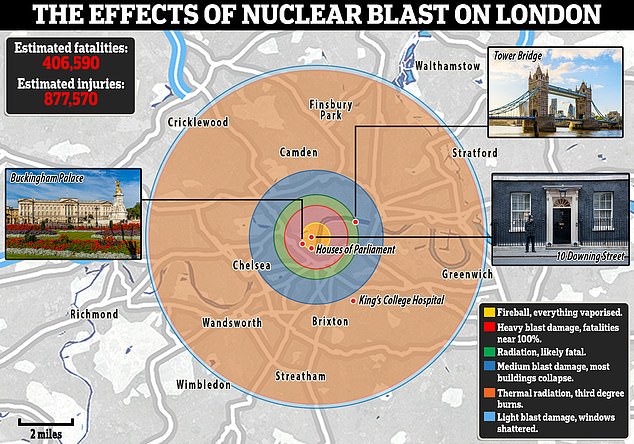
Moscow denies it is making nuclear threats, but several statements by President Vladimir Putin since the outbreak of war in Ukraine have been interpreted as such in the West.
This started on the first day of Russia’s invasion of Ukraine, when the head of the Kremlin warned of “consequences never seen in your history” for anyone who tried to hinder or threaten Russia.
Since then, Western analysts and policymakers have closely followed the debate among Russian military experts over whether Moscow should lower the threshold for nuclear use.
For example, last year Russian analyst Sergei Karaganov spoke of the need to threaten nuclear strikes in Europe to intimidate and “sober up” Moscow’s enemies.
And a slew of Russian elites, including former President and Prime Minister Dmitry Medvedev and chief propagandist Vladimir Soloviev, have routinely called for the use of nuclear weapons in Ukraine and beyond.
But the warnings have not stopped the US and its NATO allies from providing massive military aid to Ukraine, including advanced weapons systems that were unthinkable at the start of the war.
Putin has resisted aggressive calls to change Russian doctrine, which allows nuclear use in the event of “aggression against the Russian Federation with conventional weapons when the very existence of the state is threatened.”
However, he has changed Russia’s position on major nuclear treaties and said he is deploying tactical nuclear weapons in Belarus.
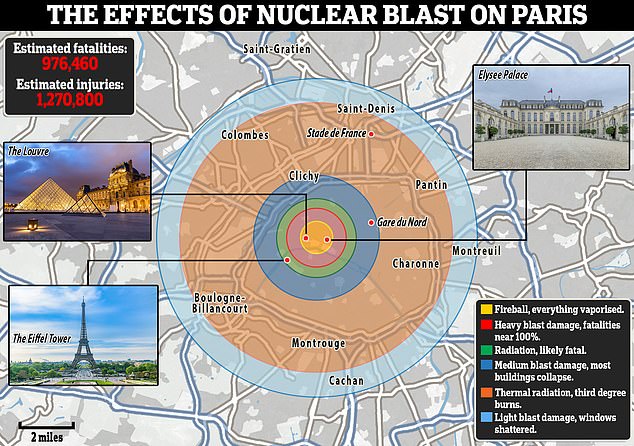
The consequences of a nuclear explosion in Paris would destroy countless cultural treasures, including the Louvre and its works of art, Notre Dame, the Eiffel Tower and the Arc de Triomphe
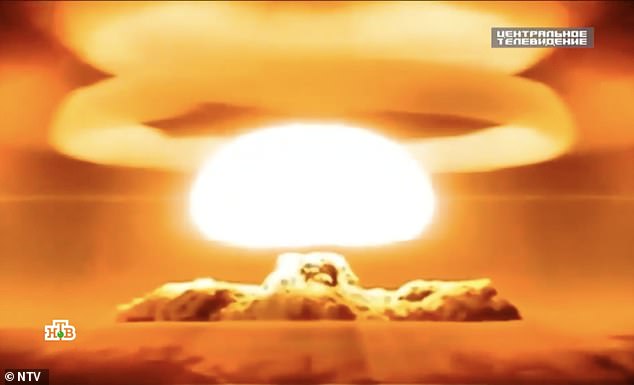
While most experts agree that the chances of a Russian attack on the West are minimal, Joe Biden has warned that the risk of Armageddon is greater than at any time since the Cuban Missile Crisis (file image, nuclear explosion shown on Russian state TV )
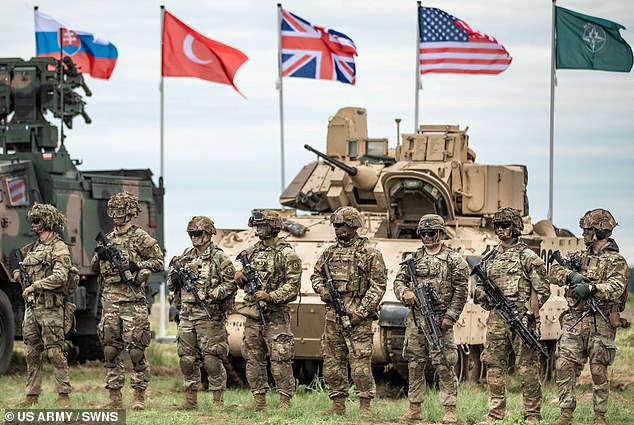
U.S. soldiers assigned to the 1st Battalion, 9th Cavalry Regiment, 2nd Armored Brigade Combat Team, 1st Cavalry Division participate in the distinguished visitors day as part of Griffin Shock 23, held in Bemowo Piskie, Poland, in May 2023
William Alberque, author of the IISS report, said Russian analyst Karaganov was part of a broader discussion in Russia about the failure of the Russian military to decisively and quickly win the war in Ukraine.
“They’re afraid, according to their own debates, that this has emboldened us further, so that’s why this nuclear debate is happening now, where they think we need to do something else to make the United States super scared,” Alberque said.
But he assured reporters that Western intelligence services could pick up some signals if Russia were actually preparing to launch an NSNW.
These include moving weapons from a central storage facility to an air base, and possibly conventional strikes near the planned target area to cripple radar and anti-missile defenses.
Putin would likely move to a nuclear shelter at that point and put Russia’s entire command and control system on alert in the event of a major nuclear response from the United States, he said.
Alberque said any Russian use of NSNW would require Moscow to calculate the right “dose” to force its adversaries to withdraw, rather than triggering a cycle of escalation.
The question of how to respond to such a scenario is what keeps American planners “up all night,” said Alberque, who previously worked at the Pentagon and NATO.
“Once the other side crosses the nuclear threshold, how do you avoid the logic of escalation, escalation, escalation to destruction?
‘How do you contain it, how do you keep it inside? This is one of the most difficult problems, this is a problem that has been around since the beginning of the nuclear age.”
